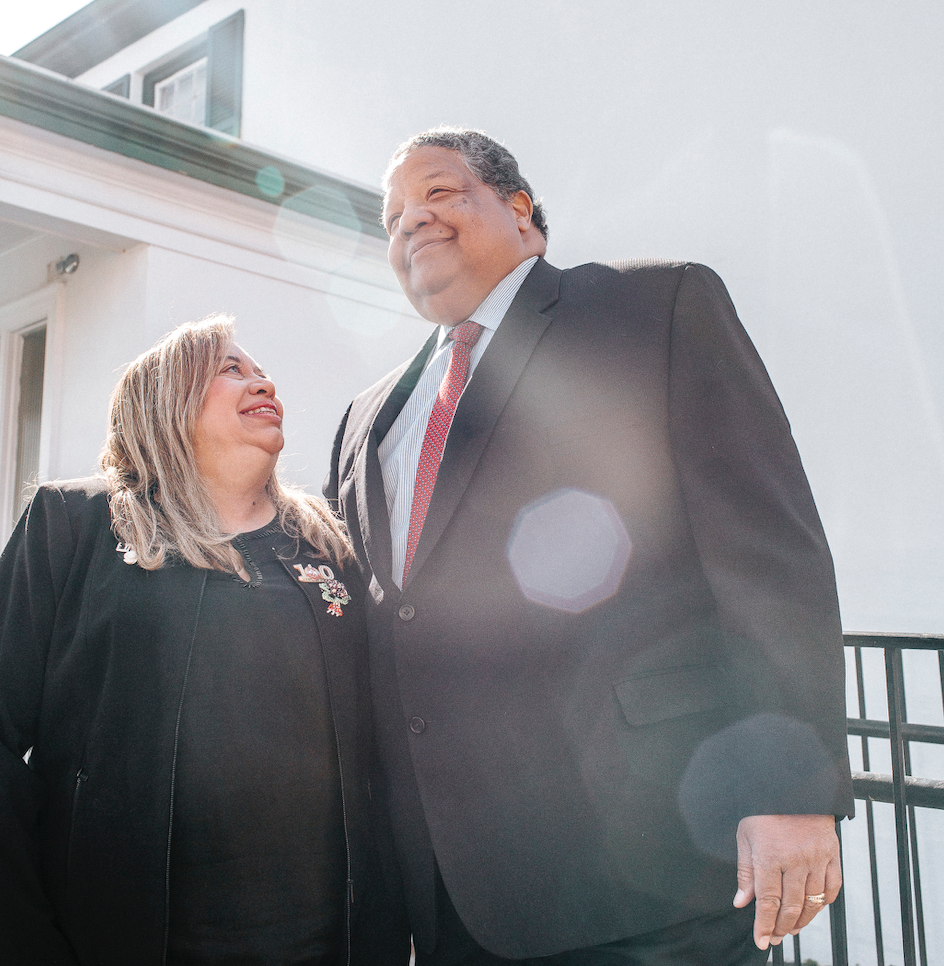In a city like Charlottesville, where Thomas Jefferson sneezed his creativity and innovation into practically every brick paver, it’s easy for
entrepreneurs to feel buoyed enough to follow a dream. It makes for an ever-changing skyline, with new businesses springing up like wildflowers.
But amid that same skyline there exists a group of businesses that have stood the test of time—some even for centuries. With this year’s Power Issue, we’re taking a look at 40 over 40: venerable establishments that have, over the course of their tenure in Charlottesville, become pillars of the community, repositories of local lore, and witnesses to the city’s transformation.
Their endurance is a testament to their commitment to quality and service, certainly, but it also endows them with a unique form of power–one that’s not merely economic, but is woven into the social and cultural fabric of the city. It manifests in their ability to shape local traditions, support community initiatives, and even steer public discourse. As we delve into the stories of the longest-running businesses in our city, we uncover how their remarkable longevity grants them a potent and enduring legacy of influence and respect.
#lawyered
McGuireWoods
1834 (190 years)
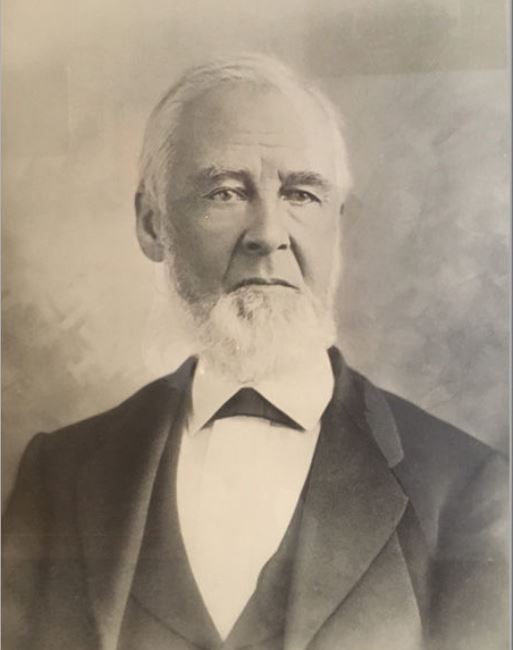
The story of local law firm McGuireWoods starts nearly two centuries ago with President James Monroe’s private secretary, Egbert Watson. An Albemarle native who began his legal career as a law clerk for George Hay (a co-counsel in the treason trial of then-Vice President Aaron Burr), Watson started his one-man law firm—the very one that would become McGuireWoods—at the Albemarle County Courthouse at age 24. Watson’s first case, tried unsuccessfully, was the defense of two Black men accused of murdering a local tinsmith.
Today, McGuireWoods is a leading full-service law firm with 21 offices and 1,100 lawyers worldwide handling cases across multiple sectors: energy, commercial, fiduciary, products and consumer goods, transportation, and labor and employment.
“Our rich culture is one of a kind, in large part because we live our core values everyday—excellence, integrity, client service, diversity and inclusion, community, and collegiality,” says Michael Sluss, McGuireWoods’ marketing and communications manager.
According to National Law Journal’s 2023 NLJ 500, McGuireWoods is the 64th highest-grossing firm in the world. Through a series of mergers and acquisitions, the firm has changed hands multiple times since its founding but continues to hold its roots in high regard.
“Our history … imbues us with a profound sense of responsibility for the firm of today and tomorrow,” says Sluss.
Good, better, best
Better Living Building Supply
1893 (131 years)

Better Living has its stamp on buildings across the city. As general contractors, they built the McGuffey School, the Barringer Wing of the original University Hospital, and Peabody Hall at the University of Virginia—not to mention subdivisions like Camelot, Foxbrook, and Green Lea.
But when L.W. Graves started the business in 1893, the company had one product: lumber. And it was delivered by horse and buggy, no less!
It wasn’t until the mid-1920s that Better Living—then known as Charlottesville Lumber—expanded into the construction business, and later, during World War II, produced portable barracks and large shipping crates to support the war effort. (Future company president Richard L. Nunley was at the time serving in the 13th Air Force in the Philippines.) It opened a furniture business in 1960, changing its name in 1969 to Better Living, but closed in 2016 to refocus on its speciality: building supplies, custom millwork, and cabinetry.
Stay fancy
Keswick Hall
1912 (112 years)
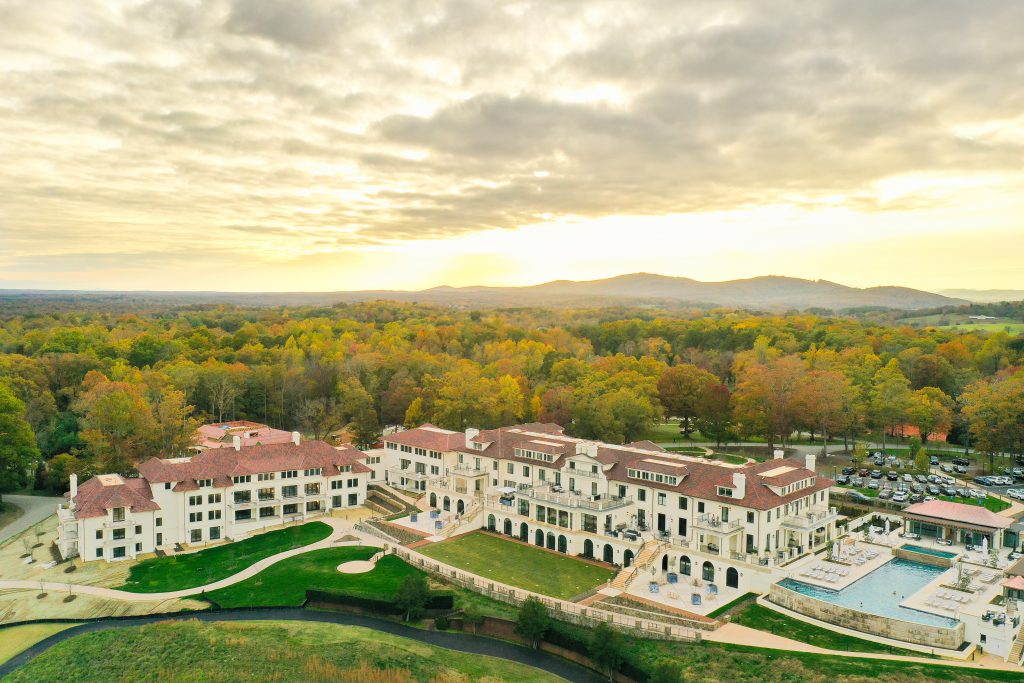
The first 35 years of Keswick Hall’s centerpiece structure, Villa Crawford, were spent as a residence to five different owners, including Robert and Florence Crawford, the couple who built it in 1912. But, as with any home—even the upscale ones—the more people living in it, the more wear and tear it acquires, and by the 1980s, it was in shambles.
The property was rescued in 1990 by Sir Bernard Ashley, an English businessman who, with his wife Laura Ashley (yes, that Laura Ashley), had a growing textile and clothing empire. Laura Ashley had passed five years prior, and Bernard began purchasing estates to convert into hotels—two in America (including Keswick) and one in England. He transformed the residence into a boutique hotel, decorating it with his own collection of antiques and giving each room a theme.
From there Keswick changed hands a few more times, but unlike before, it leveled up with each new ownership. Today the hotel is owned by Molly and Robert Hardie, longtime guests and eventually members of the club who bought the property in 2017. Together they’ve upgraded its dining (Marigold by Jean-Georges), accommodations (standardizing room sizes and creating custom-scented in-room toiletries), and amenities (a revamped horizon pool, seven-court tennis facility, and a pickleball court). And the iconic Villa Crawford? It was transformed into Crawford’s Bar, “a beautifully preserved space that retains the charm of its 1912 origins,” says Molly.
“Our design philosophy draws direct inspiration from the region’s rich environmental and historical tapestry, offering guests an authentic journey through the area’s cultural past,” she says. “Our aim is for every guest to depart with cherished memories of a stay that captures the essence of Keswick Hall’s storied heritage and contemporary comforts.”
Resting place
J.F. Bell Funeral Home
1917 (107 years)
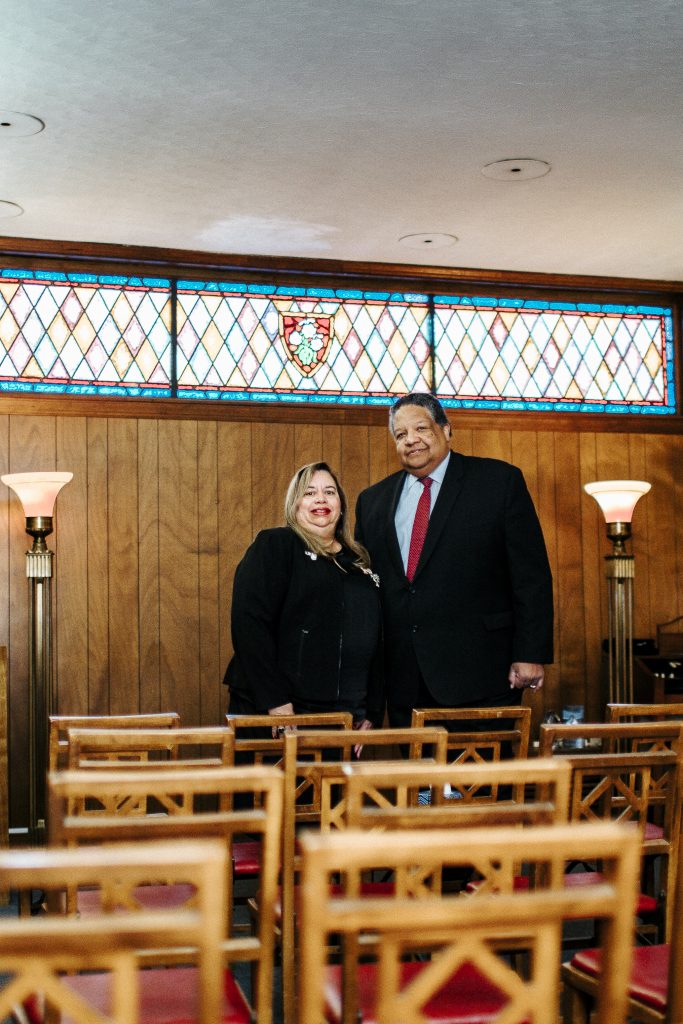
Today the oldest Black-owned business in Charlottesville, J.F. Bell Funeral Home might never have opened were it not for John Ferris Bell’s cousin, who lured the tailor to Charlottesville. A local dentist, John Jackson told Bell that the city was lacking a funeral home for its growing population of Black residents. Bell moved from Chicago, where he’d also trained as a funeral director and mortician, to the heart of Charlottesville’s Vinegar Hill neighborhood to set up shop.
He opened J.F. Bell Funeral Home in 1917 at 275 W. Main St., a two-story brick building across the street from the wooden boarding house where Bell lived. A few years after he married in 1919 to Maude Lee, who later became a funeral director herself, the couple relocated the business to its current location on Sixth Street NW, hiring a local contractor to build the funeral home with an apartment upstairs for the family.
Four generations later, J.F. Bell Funeral Home is today run by Bell’s granddaughter, Deborah Burks, and her husband Martin.
Turning the page
New Dominion Bookshop
1924 (100 years)
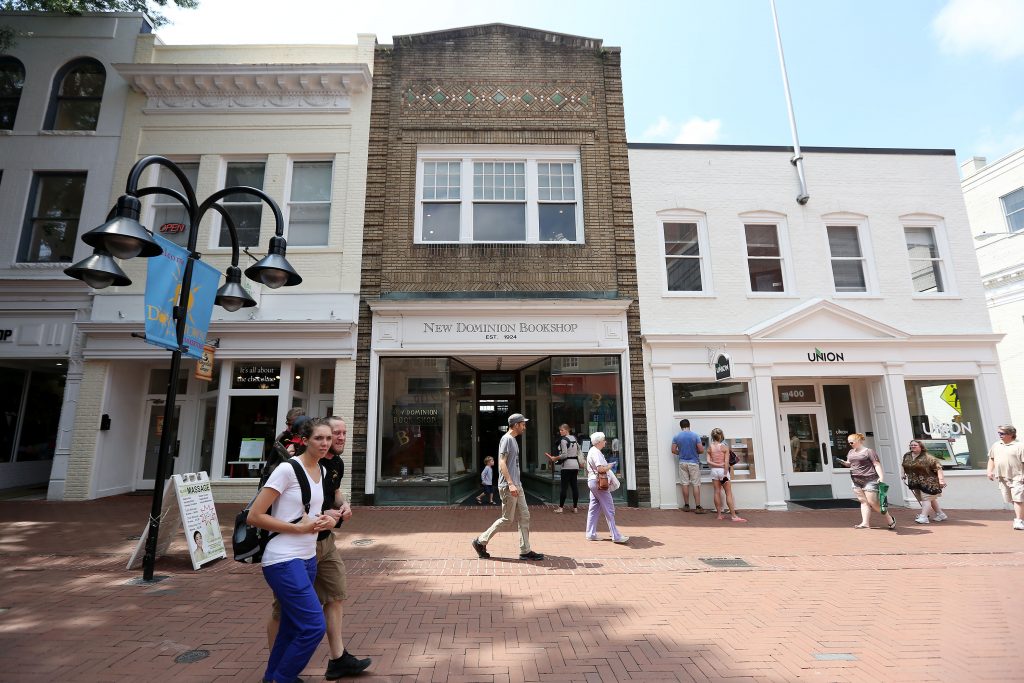
C.C. Wells, the UVA student who purchased New Dominion in 1926 and moved it to the Downtown Mall, had a dream.
“All I ever wanted to do was sell books,” Wells told Charlottesville’s Observer newspaper in 1989, two years after Carol Troxell had taken over as the shop’s owner. And that’s exactly what he did, to hordes of customers who will likely forever remember seeing their favorite author give a book talk at the base of the store’s iconic staircase, or having one of the knowledgeable staff members pick out their next favorite read, or even getting married (the shop has recently begun offering microweddings for bibliophiles)!
The oldest independent bookstore in Virginia, New Dominion continues to build on its legacy. In 2017, creative writing M.F.A. and former schoolteacher Julia Hoppe purchased the store, making a few modern changes (including a new cash register and website) while keeping the best of what Wells (and Troxell) had established before her.
Open to all
Barrett Early Learning Center
1935 (89 years)
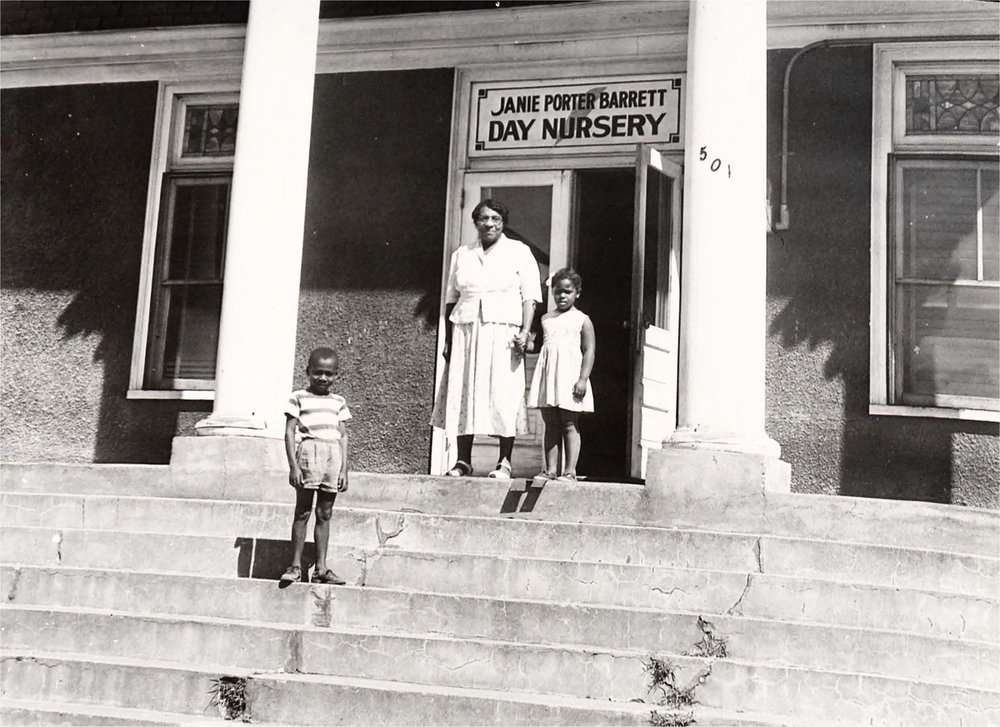
Born to a formerly enslaved woman just after the Civil War, Janie Porter Barrett spent a lifetime advocating for the rights and education of Black girls and women. She studied at Hampton University, taught there and at industrial schools in Georgia, and eventually founded the Locust Street Settlement House, where local Black students would come for classes, entertainment, and childcare.
In 1915, Barrett opened the Industrial School for Wayward Colored Girls near Hanover to serve Black girls paroled from the prison system; it was renamed the Janie Porter Barrett School for Girls in 1950.
But it was in 1935 that, under FDR’s Works Progress Administration program, the Janie Porter Barrett Day Nursery opened its doors in Charlottesville’s Vinegar Hill neighborhood. It remained there until 1958, when the United Way (then Community Chest) gifted it a new home on Ridge Street. In the years since, it has become a fixture for the neighborhood as one of the few affordable childcare options for low-income residents, and it still attracts generations of mostly Black families.
In 2013 it nearly shuttered due to financial hardship, but residents rallied, forming a board of directors that within a month raised more than $30,000 to keep its doors open, demonstrating its vital role in the community.
Pipes to t-shirts
Mincer’s
1948 (76 years)
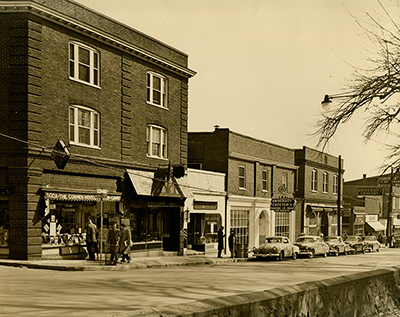
Everyone’s favorite UVA merch spot didn’t always sell apparel with the University logo. In fact, the Corner shop’s first product was … pipes?
Robert Mincer started the business just after the end of World War II, following a layoff from his job as a foreman at a Long Island-based pipe manufacturer. Too many military-issued pipes had made their way back to the United States post-war and, thanks to increased supply and demand, Mincer needed to find his next step. He and his wife moved to Charlottesville, where they opened a 100-square-foot smoke shop.
The store evolved over time to the sportswear business it is today, moving to its current location at the corner of Elliewood and University avenues, and expanding the product line to include everything from t-shirts and sweatshirts to books, water bottles, and toys for kids. It’s the go-to spot for UVA merch—especially after UVA wins a game.
Today the store, which opened a second location at Stonefield Shopping Center in 2013, is run by Mincer’s great-grandson, Cal, who took the reins in early 2023 following the passing of his father, Mark, who himself had run the store since graduating from the University’s McIntire School in 1985.
Spree spot
Barracks Road Shopping Center
1957 (67 years)
Before there was the Downtown Mall, there was Barracks Road Shopping Center. In fact, the success of Barracks Road was a major impetus for the Mall’s conversion. The shopping center touted “acres of free parking” on its first run of advertisements from developer Rinehart, luring shoppers from Main Street’s metered spots and prompting studies in 1959 to reboot downtown’s popularity shortly after Barracks Road opened.
Today Barracks Road is one of the oldest shopping centers in the country, with a mix of 80+ stores, restaurants, and experiences that include both big-name brands like Madewell, Warby Parker, and Ulta, as well as locally owned boutiques like Scarpa and Happy Cook.
“Known for its evolving collection of popular national and regional brands, intertwined with the allure of specialty local boutiques, eateries, and convenient services, Barracks Road continues to attract and maintain retailers,” says Sarah North, senior director of marketing for Federal Realty, who owns the shopping center. “Barracks will remain a fundamental member of the community and we look forward to the next 40 years.”
Play’s the thing
Shenanigans
1974 (50 years)
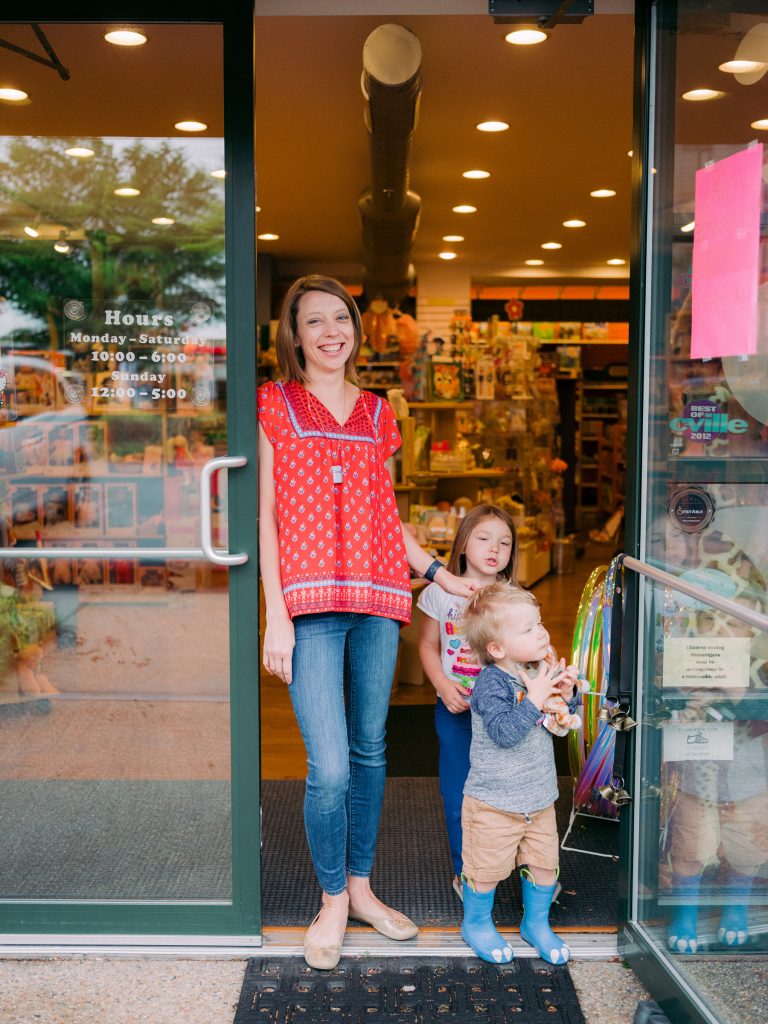
When Kai Rady moved to Charlottesville with her family in 1974, she was surprised (and dismayed) to find it didn’t have a toy store. Her son was active and curious, and she needed things to keep him stimulated.
Rady remembered seeing an article in Ms. Magazine (“a terrific list of at least 100 items, 90 percent of which were not in the area—including LEGO!” she told C-VILLE in 2013) and it spurred her to start her own store. She opened Shenanigans in her Ivy Road home before moving it to Barracks Road Shopping Center and, eventually, to its current spot on West Main Street.
Now 50 years in, the store hasn’t changed much in terms of its mission: “I’m looking always for play value,” Rady told us. “A toy can be very educational … but if they’re not going to play with it, it’s not [useful]. It has to appeal to a child’s sensibilities.”
Amanda Stevens, a former elementary school teacher and principal, purchased the beloved shop with her husband Jimmy in 2019 and has since made a few valuable changes, including creating an online inventory.
“Generations of families have shared in the wonder of Shenanigans Toy Store over the last 50 years, and our family considers it a tremendous honor to be a part of this legacy,” Stevens said in a press release announcing the store’s 50th anniversary. “We treasure our customers’ loyalty, the opportunities we have to interact with families, and the chance to give back to children in the community.”
Making history
The story of Charlottesville’s life wouldn’t be complete without each of these well-established players:
1759 Boar’s Head Resort (265 years)
1834 McGuireWoods (189)
1872 Hanckel-Citizens Insurance (152)
1873 Schwarzschild Keller & George
Jewelers (151)
1878 The Miller School of Albemarle (146)
1890 Timberlake’s (134)
1892 The Daily Progress (132)
1893 Better Living (131)
1893 Martin Hardware (131)
1903 Sentara Martha Jefferson
Hospital (121)
1907 Hill & Wood (117)
1909 Gitchell’s Studio (115)
1910 St. Anne’s-Belfield School (114)
1910 Standard Produce (114)
1912 The Jefferson Theater (112)
1912 Keswick Hall (112)
1912 Snow’s Garden Center (112)
1917 JF Bell Funeral Home (107)
1920 Men’s & Boys’ Shop (104)
1921 Fry’s Spring Beach Club (103)
1922 WE Brown (102)
1923 Staples Barbershop (101)
1923 The Virginian (101)
1924 New Dominion Bookshop (100)
1928 Michie Tavern (96)
1929 Farmington (95)
1931 The Paramount Theater (93)
1935 Riverside Lunch (89)
1935 Barrett Early Learning Center (89)
1935 Settle Tire (89)
1944 Jak and Jill (80)
1945 Tuel Jewelers (79)
1948 Mincer’s (76)
1950 Eljo’s (74)
1950 Korner Restaurant (74)
1951 The Nook (73)
1953 Foods of All Nations (71)
1953 White Spot (71)
1957 Barracks Road Shopping Center (67)
1964 Charlottesville Sanitary Supply (60)
1964 Boar’s Head Resort (60)
1965 Aberdeen Barn (59)
1972 Greencroft (52)
1973 Charlottesville Aquatics (51)
1973 Four County Players (51)
1973 Ivy Inn (51)
1974 Crutchfield (50)
1974 Daedalus Bookshop (50)
1974 Shenanigans (50)
1975 Integral Yoga (49)
1975 Ivy Nursery (49)
1976 C&O (48)
1976 Downtown Mall (48)
1978 Durty Nelly’s (46)
1979 Blue Moon Diner (45)
1979 Market Street Wine (45)
1979 Martin Horn (45)
1981 Miller’s (43)
1982 Ragged Mountain Running & Walking Shop (42)
1984 Spectacle Shop (40)
